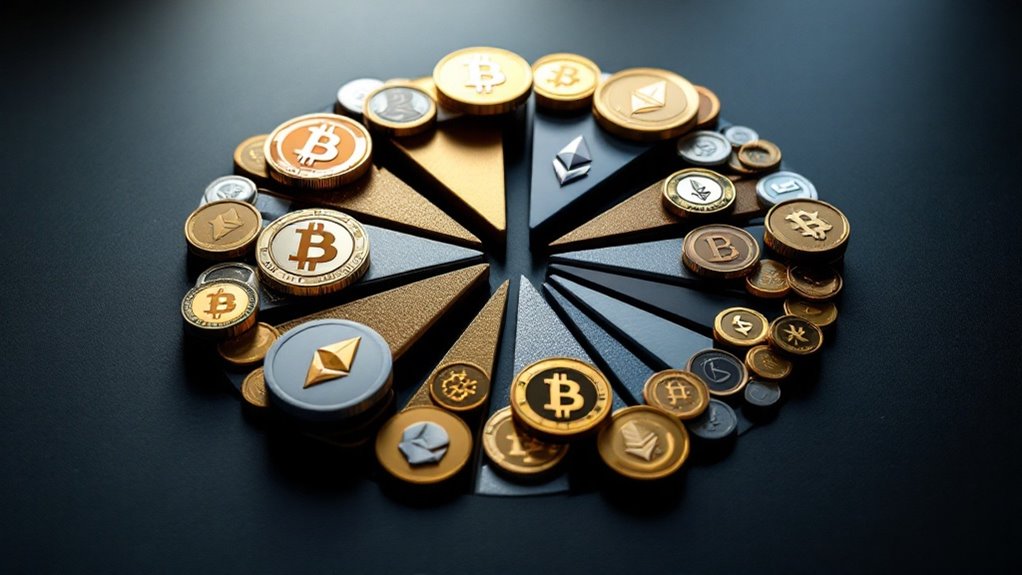Mining pools operate like digital farming cooperatives, allowing individual cryptocurrency miners to combine their computing power for better results. Instead of working alone, miners join forces to solve complex mathematical puzzles and share the rewards based on their contributed hashrate. Major pools like Foundry and AntPool dominate the landscape, though some worry this concentration of power contradicts blockchain's decentralized spirit. Understanding these collaborative networks reveals how modern mining balances efficiency with democratic principles.

While individual cryptocurrency miners often struggle to compete with large-scale operations, mining pools have emerged as a democratic solution that levels the digital playing field. Like digital cooperatives, these pools allow miners to combine their computational resources, working together to crack complex cryptographic puzzles that would be nearly impossible to solve alone. The concept mirrors traditional farming cooperatives, where small farmers band together to compete with industrial agriculture. These collaborative efforts consume significant electricity annually, reaching approximately 150 TWh for Bitcoin mining alone.
The inner workings of mining pools are elegantly simple, yet mathematically sophisticated. Pool operators orchestrate a symphony of computing power, directing thousands of miners' efforts toward a common goal. When a block is successfully mined, the rewards ripple through the pool like raindrops in a pond, with each participant receiving their fair share based on their contributed hashrate. Leading pools like Foundry and AntPool command massive computational power, with Foundry alone wielding an impressive 170.96 EH/s hashrate. The process actively prevents double-spending attacks while maintaining network security.
Mining pools transform solitary computing power into a collective digital force, distributing blockchain rewards like clockwork across their vast network of participants.
Different pools offer varying reward structures, each with its own philosophical approach to distribution. Some pools, like those using pay-per-share systems, offer the comfort of predictable daily payments, while others embrace the excitement of proportional rewards based on luck and timing. It's rather like choosing between a steady salary and commission-based work, each with its own appeal to different risk appetites. Miners receive nonces to guess puzzles that consume significant computing power.
However, the mining pool ecosystem isn't without its thorns. The concentration of mining power in large pools has raised eyebrows among cryptocurrency purists, who worry about the specter of 51% attacks looming over the network. Pool fees, typically ranging from 1% to 3%, quietly chip away at profits like a subtle tax on mining rewards.
Looking ahead, mining pools are evolving with the times, embracing sustainable practices and exploring decentralized structures. The industry is dancing a delicate ballet between efficiency and decentralization, all while adapting to seismic shifts like Ethereum's move to proof-of-stake.
As cryptocurrency mining matures, pools continue to serve as vital bridges, connecting individual miners to the vast digital mining landscape while maintaining the democratic spirit of blockchain technology.
Frequently Asked Questions
How Long Does It Take to Receive Mining Rewards From a Pool?
Mining reward timing varies based on pool size, hash rate contribution, and payout scheme. Large pools may pay daily or hourly, while smaller pools typically distribute weekly or monthly, depending on minimum thresholds.
What Happens if a Mining Pool Gets Hacked?
If a mining pool is hacked, attackers may steal pooled funds, disrupt operations, or compromise user data. Pools typically suspend activities, investigate the breach, communicate with members, and attempt to recover stolen assets.
Can I Switch Between Different Mining Pools Whenever I Want?
Miners can freely switch between different mining pools at any time by changing the pool address in their mining software. However, they should consider pending rewards and minimum payout thresholds before switching.
Do Mining Pools Work With All Types of Cryptocurrency?
Mining pools don't support all cryptocurrencies. They primarily work with proof-of-work coins like Bitcoin and Litecoin, while proof-of-stake cryptocurrencies and certain niche coins lack pool compatibility due to technical limitations.
What's the Minimum Hash Rate Required to Join a Mining Pool?
Minimum hash rate requirements vary by pool, with no universal standard. Some pools accept rates as low as a few MH/s for GPU mining, while ASIC mining typically needs several TH/s to be profitable.









